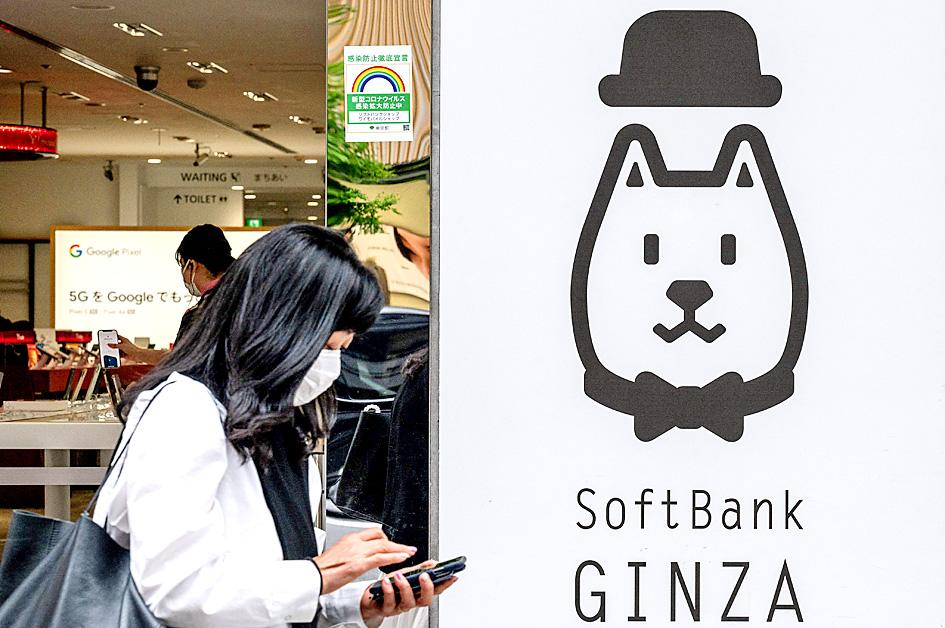Investment giant Softbank Group Corp yesterday reported an annual net profit of US$45.8 billion, the best ever for a Japanese company, reaping the rewards of tech share rallies to recover from last year’s record loss.
The telecoms turned investment behemoth has poured money into some of Silicon Valley’s biggest names and hottest new ventures from artificial intelligence to biotech through its US$100 billion Vision Fund.
“The technology sector, where the company focuses its investment strategies, has been positively impacted by the accelerated adoption of digital services to address the pandemic,” Softbank said in a statement.

Photo: AFP
“However, there is no guarantee that the current positive impact will be sustained in light of uncertainties associated with the pandemic,” it said.
Net profit for 2020-2021 was ¥4.99 trillion (US$45.9 billion), Softbank said, exceeding its target and putting it in the ranks of the world’s most profitable companies.
In 2019-2020, Softbank posted a record net loss of ¥961.6 billion, as the start of the COVID-19 pandemic compounded problems caused by its investment in troubled office-sharing start-up WeWork.
However, it quickly returned to profit as the impact of COVID-19 lockdowns worked largely in Softbank’s favor, with rising valuations for firms in its portfolio suited to the era.
South Korean e-commerce giant Coupang Corp, backed by Softbank, in March raised more than US$4 billion in its initial public offering (IPO) — making it the biggest listing in the US so far this year, as people flocked to shop online during lockdowns.
The value of Vision Fund’s stake in US food delivery app DoorDash Inc also rose massively following its IPO in December last year.
Softbank CEO Masayoshi Son, Japan’s richest person according to Forbes, in February hailed the Vision Fund as a “goose that produces golden eggs.”
Having transformed Softbank into an investment giant, Son has battled critics of his commitment to sometimes-troubled start-ups, and brushed aside doubts over a massive asset sale program.

To many, Tatu City on the outskirts of Nairobi looks like a success. The first city entirely built by a private company to be operational in east Africa, with about 25,000 people living and working there, it accounts for about two-thirds of all foreign investment in Kenya. Its low-tax status has attracted more than 100 businesses including Heineken, coffee brand Dormans, and the biggest call-center and cold-chain transport firms in the region. However, to some local politicians, Tatu City has looked more like a target for extortion. A parade of governors have demanded land worth millions of dollars in exchange

Hong Kong authorities ramped up sales of the local dollar as the greenback’s slide threatened the foreign-exchange peg. The Hong Kong Monetary Authority (HKMA) sold a record HK$60.5 billion (US$7.8 billion) of the city’s currency, according to an alert sent on its Bloomberg page yesterday in Asia, after it tested the upper end of its trading band. That added to the HK$56.1 billion of sales versus the greenback since Friday. The rapid intervention signals efforts from the city’s authorities to limit the local currency’s moves within its HK$7.75 to HK$7.85 per US dollar trading band. Heavy sales of the local dollar by

Taiwan Semiconductor Manufacturing Co’s (TSMC, 台積電) revenue jumped 48 percent last month, underscoring how electronics firms scrambled to acquire essential components before global tariffs took effect. The main chipmaker for Apple Inc and Nvidia Corp reported monthly sales of NT$349.6 billion (US$11.6 billion). That compares with the average analysts’ estimate for a 38 percent rise in second-quarter revenue. US President Donald Trump’s trade war is prompting economists to retool GDP forecasts worldwide, casting doubt over the outlook for everything from iPhone demand to computing and datacenter construction. However, TSMC — a barometer for global tech spending given its central role in the

An Indonesian animated movie is smashing regional box office records and could be set for wider success as it prepares to open beyond the Southeast Asian archipelago’s silver screens. Jumbo — a film based on the adventures of main character, Don, a large orphaned Indonesian boy facing bullying at school — last month became the highest-grossing Southeast Asian animated film, raking in more than US$8 million. Released at the end of March to coincide with the Eid holidays after the Islamic fasting month of Ramadan, the movie has hit 8 million ticket sales, the third-highest in Indonesian cinema history, Film